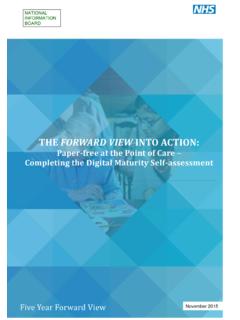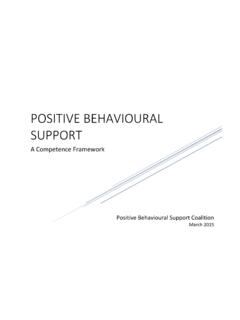Transcription of The seven key questions about Positive Behaviour Support
1 The seven key questions about Positive Behaviour Support In the last few years Positive Behaviour Support in the UK has developed from a process implemented by a very small but committed group of people to a movement which is now embedded in government policy. It is at the heart of the Department of Health policy document Positive and Proactive Care published in April 2014. Those people who deliver good Positive Behaviour Support every day, either as a professional or a family carer understand it well, but others organisations, Support workers, families, individuals themselves, may be looking for a useful introduction. The seven key questions and answers below have been developed by BILD s Positive Behaviour Support consultants and are the questions that are most regularly asked by the individuals and organisations they work with. The answers are short as they re meant to give a brief overview of Positive Behaviour Support .
2 Links and references are included to help you find out more information, and there are books about PBS giving much more depth and detail available on the BILD website at 1. What is Positive Behaviour Support ? This is a simple question , but can have a complex answer. Put simply, Positive Behaviour Support is: An understanding of the Behaviour of an individual. It is based on an assessment of the social and physical environment in which the Behaviour happens, includes the views of the individual and everyone involved, and uses this understanding to develop Support that improves the quality of live for the person and others who are involved with them. BILD: The seven key questions about Positive Behaviour Support 1 Taken from the BILD Positive Behaviour Support Jargon Buster, available at: Giving more detail, BILD s International Journal of Positive behavioural Support (Autumn 2013) defined Positive Behaviour Support , for the UK, as: A multi-component framework for: developing an understanding of the challenging Behaviour displayed by an individual, based on the assessment of the social and physical environment and broader context within which it occurs with the inclusion of stakeholder perspectives and involvement using this understanding to develop, implement and evaluate the effectiveness of a personalised and enduring system of Support and that enhances the quality of life outcomes for the focal person and other stakeholders Definition and scope for Positive behavioural Support , Gore et al.
3 , International Journal of Positive behavioural Support , Vol 3 No 2, Autumn 2013 2. What has Positive Behaviour Support got to do with challenging Behaviour ? The BILD publication Promote Positive Behaviour by Sharon Paley explains: A person may behave in challenging ways for many reasons, and they must be understood if a suitable alternative is to be found. Understanding the factors that contribute to this Behaviour will enable you to provide good Support to that individual, and this is where Positive Behaviour Support (PBS) helps. 3. How does it work? This is a simple overview of how Positive Behaviour Support works. Stage 1: Collection and analysis of data relating to the Behaviour concerned. This includes an examination of what happens before, during and after the Behaviour , how intense it is, how often it happens and how long it lasts. BILD: The seven key questions about Positive Behaviour Support 2 Stage 2: When you feel that you have a detailed understanding of a the Behaviour and why it is happening, design and put in place a number of strategies to reduce the person s unwanted behaviours and enhance their lifestyle opportunities and wellbeing.
4 The strategies are grouped as: Primary strategies: Everything that is put in place that reduces the likelihood of the Behaviour happening; for example managing situations that you know will trigger a Behaviour , changing environments, and providing opportunities for new experience and acquiring new skills. Secondary strategies: These are plans for what to do if the primary strategies do not work and Behaviour starts to escalate. These might include using calming approaches, changing the environment, diverting the person s attention to an activity they enjoy. Reactive strategies: These are planned, robust strategies that are put in place to be used as a response to an incident of challenging Behaviour . They aim to take control of a situation and minimise the risk to the person and others. Stage 3: Regularly review and revise the Support provided to make sure that it reflects their current needs, interests, health and wellbeing and risks.
5 Further information available in the book: Promoting Positive Behaviour , Sharon Paley, BILD. 4. How do you know it works? There is a growing body of academic evidence-based practice and research that supports the use of Positive Behaviour Support , and in particular in the reduction of the use of restrictive practices. For examples of this see International Journal of Positive behavioural Support , (Webber et al IJPBS autumn 2012), (Allen et al IJPBS Spring 2012). In addition there is a wealth of anecdotal evidence of the effect of Positive Behaviour Support on improving lifestyle and reducing restrictive practices. 5. Is it ethical? Positive Behaviour Support is ethical because it is: Person-centred Involves all stakeholders, including the individual Carried out for the benefit of the individual Does not use punishment Transparent and honest BILD: The seven key questions about Positive Behaviour Support 3 BILD: The seven key questions about Positive Behaviour Support 4 See also Beauchamp and Childress (2011), Principles of biomedical ethics.
6 This describes five important ethical principles, and provide a useful yardstick with which to measure the ethics of any proposed intervention. 6. Who can do Positive Behaviour Support ? It is likely that a Positive Behaviour Support specialist will do the analysis, and devise plans and strategies, but everyone involved with the individual, including the individual themselves, should have an input into developing and carrying out the plans. 7. How long will it take? Positive Behaviour Support does not assume that a Behaviour will cease. Its aim is reduce the likelihood of it happening, although Behaviour can stop. However this does not mean that the Positive Behaviour Support should be withdrawn. It should be reviewed and adapted to meet the new circumstances. British Institute of Learning Disabilities Birmingham Research Park 97 Vincent Drive Edgbaston Birmingham B15 2SQ 0121 415 6970

















